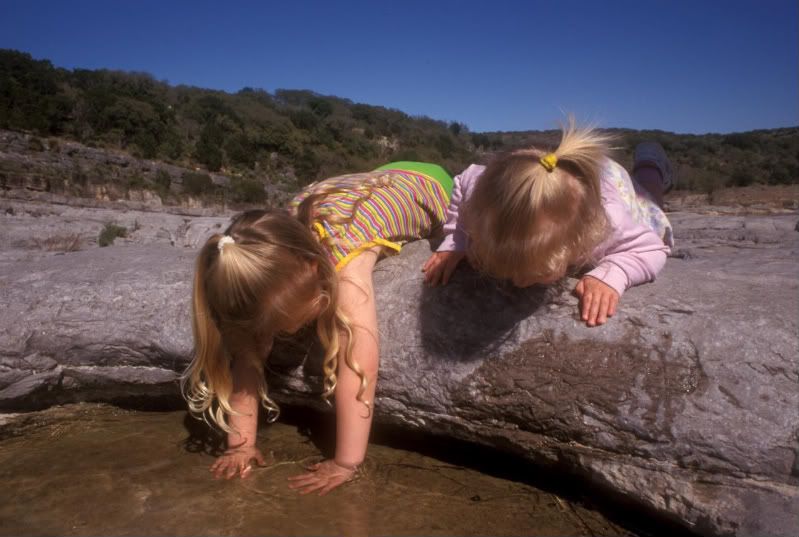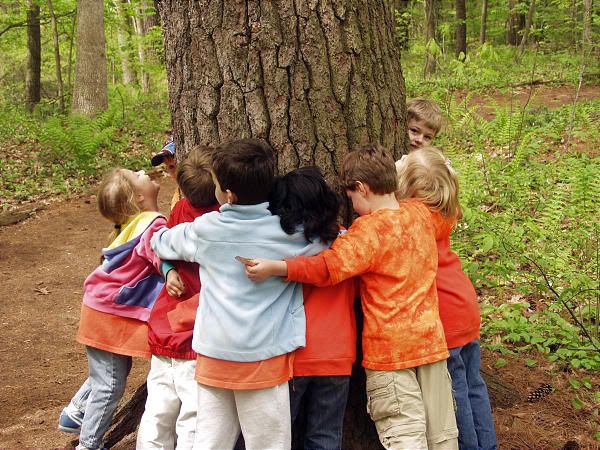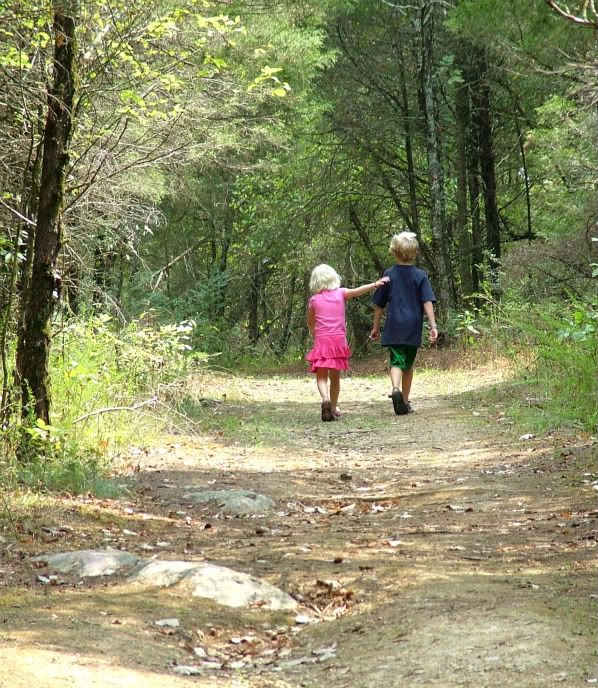
***
An Article by Earthwatch Institute
Found at http://www.treehugger.com/
****
Is creating the next generation of environmental stewards as easy as sending your kids outside to play? Research suggests the answer is yes. A study done several years ago by Louise Chawla tried to understand what factors went into the make-up of people who demonstrated significantly pro-environmental behavior. After doing a psychometric profile of these people Chawla found they all had one characteristic in common: they all spent a significant amount of time outdoors playing in the wild.
Recent research has continued to expand and support the idea that more than any other factor the act of getting children outdoors will powerfully impact their desire to preserve the natural world. As prominent environmental educator David Sobel eloquently stated, "One transcendent experience in nature is worth a thousand nature facts." It turns out that children who have an immersive experience in nature between the ages of 5 and 10 foster a deep love of the environment that they carry with them their entire lives. Aside from significantly increasing the likelihood that they will actively work to preserve the important life-giving aspects of the environment as adults, an engagement with nature has other positive cognitive impacts, from improved performance in school to moral development to a greater involvement and concern for community well-being. A recent study of 300 of the world's most innovative thinkers and leaders showed clear links between childhood immersion in nature and an out-of-the-box creativity and tireless commitment to society.
A recent book entitled Last Child in the Woods by Richard Louv highlights the social reality that rather than connecting our kids with nature, American families are increasingly removing their kids from the wild. Conducting interviews with kids across America, Louv documented how today's children are distanced from nature and issues of sustainability in a number of ways that ultimately lead to a devaluing of the environment. Whether they cloister themselves indoors to watch TV and play video games (which studies have shown have a negative impact on brain development), or are kept indoors by nervous or over-achieving parents, the long-term trend which is separating children from nature has dramatic future consequences for our collective survival.
If you read or listen to the news at all, you encounter daily accounts about the widespread environmental challenges that we all must deal with. This trend is both disheartening and bewildering. Disheartening because we know our children will not share the same world we grew up in; bewildering because despite all the evidence, we are not doing much to reinvest ourselves and our kids with time spent in imaginative, unstructured play outside.
If we wish to raise environmentally-conscious children who will be engaged with the issues of sustainability, it is time we placed significant effort on bringing them back outdoors. Of course, for many of this, this task is easier said than achieved, especially for families living in urban areas. Not to worry. Bringing kids to play in a park, getting them involved with gardening also have positive add on effects-just to as strong as those encountered by an experience in the woods, by a pond, or in the mountains.
By: Alan Fortescue

12 Simple Habits to Help the Environment
Let’s face it: we all want to help the environment, but many times we are too busy with our daily lives to make the big changes that we think are needed to develop a more sustainable lifestyle and a more environmentally friendly culture. We don’t have time to lobby for climate change initiatives, or get involved with Green Peace, or fit our houses with solar panels, or even buy a hybrid car.
Fear not, my friends, there is another way: make small, simple, easy habit changes that all add up to a more environmentally friendly lifestyle.
You don’t need to incorporate them all at once. Do them one at a time, until you’re doing all or most, and you can be proud of what you’ve done. These are nothing new, but it’s useful to consider adopting them into our daily lifestyles. Here they are:
Use CFLs. These energy-saving lightbulbs are a little more expensive than regular lightbulbs, but they last much longer and will lower your power bill in the long run. The habit to develop is to buy a couple of these at a time, instead of the regular incandescent bulbs, and replace your bulbs with CFLs as they burn out. In a few months, your entire house will have energy-saving bulbs. Simple!
Buy used first. Instead of going straight to the store to buy a new gizmo, gadget, widget or hoozit, see if you can find a used one instead. If it’s already been used, you’re lengthening the lifetime of that product, and reducing the need for new ones, which in the end saves the environmental impact of creating and selling that item. And it’s an easy habit: ask around, and someone might have a used hoozit to give away for free (or cheap), or look in used shops or yard sales. Plus it’s fun!
Donate your stuff. Got a bunch of stuff you want to get rid of? Don’t contribute to the landfill. If it’s usable, give it to someone who needs it. Or donate it to a charity thrift shop — they can sell it for a little bit of fund-raising cash, so you’re not only lengthening the life of that item but helping a good cause. The habit to develop: when weeding out your old stuff, put them in a box or basket near the door. Then when you run errands, grab the box and drop it off at a charity shop. If it’s an expensive item, you could email your friends and family to give them the first shot at it.
Recycle. Yeah, this is old hat. But it’s important. Many of you will live in cities or towns where recycling is easy — you just put your glass, paper, plastic and cans in bins at the curbside, and the recycling truck picks it up like the regular garbageman does. For those of us who don’t live in such progressive areas, we have to find a recycling center and drop it off. Either way, the simple habit to develop is to have separate containers for each type of recyclable good, and simply separate them at the point of disposal instead of tossing them in the trash. For those of us who have to drop them off somewhere, just throw the boxes in your trunk (along with your donation box) and drop them off on errand day.
Buy energy-efficient appliances. Similar to the CFL item above, this can be done on a replacement basis — no need to run out and buy a bunch of new stuff. But when you do need to buy a new washer or fridge or anything, really, make energy efficiency one of your top criteria. This goes for cars as well.
Use less stuff. One of the biggest problems we have as a society is overconsumption. We buy, consume, and throw out a huge amount of stuff. More than any other society in history. The habit to develop is to see if you can do without something instead of running out and buying it. When you feel the urge to buy something, hesitate. Put it on a 30-day list, and don’t buy it until 30 days have elapsed since you put it on the list. Instead, while you’re waiting, think about whether it’s truly necessary, and again, are there ways to get it used or to do without it.
Use cloth grocery bags. Paper or plastic? Paper is better, but cloth is even better than that. It’s a very easy habit: buy a few cloth grocery bags (or better yet, make your own or get them used!) and take them to the grocery store. Some stores will even give you a discount for using reusable bags. If expense is an issue, just buy 1-2 at a time, until you eventually are using all cloth bags.
Turn things off. Many times we have a habit of leaving things on. This wastes energy, which contributes to the burning of more fossil fuels and global warming. Instead, develop the habit of turning things off when you don’t use them: lights, air conditioners, water heaters, computers, televisions, etc.
Walk and cycle more. Cars are one of our biggest polluters and fuel wasters. Do as David does, and try to go carless! Even if this is not practical for you on a daily basis, you can try to use the car less often — walk to the store or school for short trips, and try making many of your medium-distance trips on bike. Bonus: you’ll burn more calories and lose weight!
Think about packaging. Besides the production and waste of the goods themselves, the packaging of products is hugely wasteful. The habit to develop: when you’re shopping, look for products that use less packaging than others. Some companies go out of their way to minimize packaging. Bulk products are also good for this. And avoid styrofoam products and packaging as much as possible, because of the harmful pollutants used to produce them.
Eat local foods. One thing most of us rarely think about when we eat something is how far that food had to travel to get to our plate. Oftentimes its thousands and thousands of miles — sometimes halfway around the world! Think about how much fuel is wasted bringing those items to you, when similar food is often grown right there in your area. The habit to develop: when shopping at a grocery store, see if there are any fruits and vegetables labeled as “grown locally”. It’s also great to shop at farmer’s markets and other such venues with locally grown foods.
Avoid McDonald’s. Well, not just McDonald’s, but they’re the worst. Not only is their food nutritionally empty, and actually harmful to your health, but they are one of the worst polluters and destroyers of the environment. Their huge supply of beef requires the destruction of rainforest and a huge contribution to global warming. Not to mention all their unnecessary packaging. Actually, all fast food companies are guilty of this. Habit to develop: adopt the attitude of the Slow Food movement (basically, the opposite of fast food), eat at home or at sit-down restaurants, and take the time to enjoy your food. Your palate, your stomach, your heart and the environment will thank you.
It’s a simple list, but I’m sure you could easily think of a dozen more. The main point is to change your lifestyle in small and easy ways, over time, and soon you’ll be just as much of an eco-head as David! Bonus: almost all of these habits save money!

{Images linked/Programming by DPC}
Take Action
http://www.change.org/actions

